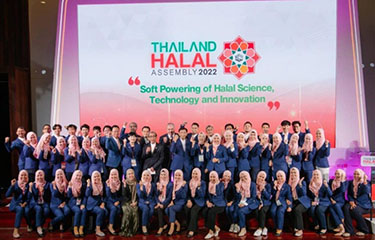Thailand's food industry is prioritizing halal certification, focusing on exports of canned seafood and functional foods, among other items.
Halal food is certified to adhere to Islamic dietary laws. The global market for halal products has an estimated value of USD 2 trillion (EUR 1.8 trillion) and is expected to reach USD 3 trillion (EUR 2.7 trillion) by 2026. In 2021, Thailand exported USD 6 billion (EUR 5.5 billion) in halal-certified food, ranking it 15th globally. It is targeting a 3 percent increase in that total for 2023, following the growth in the world's Muslim population to 2.2 billion by 2030, according to the Central Islamic Council of Thailand.
While primarily a Buddhist country, the Thai government and its largest food manufacturers have recognized an opportunity in the market, according to Halal Standard Institute of Thailand Director Pakorn Priyakorn.
"Our halal certification process is globally recognized. We have the highest number of halal-certified products in the world," Priyakorn said in a press release.
Thailand has established a good reputation for its certified-halal quality products and the country has a robust certification and support system in place, priming it for expansion, according to Priyakorn. More than 160,000 products, 33,000 brands, and 14,000 companies from Thailand have received halal certification, as of April 2023. Thailand’s pavilion at the upcoming Thaifex trade show will feature a special halal market section that will showcase trending and innovative halal products, Priyakorn said.
"Our approach to maintaining the standards of Thai halal products is based on the principles of 'religious confirmation and scientific support,'" Priyakorn said.
The Central Islamic Council of Thailand has partnered with several halal certification bodies, including the Standards and Metrology Institute for Islamic Countries, as well as Chulalongkorn University’s Halal Science Center, to ensure the validity of the halal certifications being used by Thailand’s food producers. Together, they are pushing the use of science-based methods in the production, inspection, and certification of Thailand’s halal food exports.
Some of Thailand’s largest food companies, including CP Group and Betagro, have invested significantly in their halal food production processes and overseas marketing. A number of seafood products, including the popular Tao Kae Noi-brand seaweed snack, which is exported to more than 37 countries, have been recently granted halal certification, and their producers are seeking to expand their distribution to Islamic markets, he said.
“These strategic investments are in tune with the global trend among companies to tap into the growing halal market and capture Islamic consumers,” Priyakorn said.
Thailand's halal industry extends beyond food to touch on cosmetics, fashion, pharmaceuticals, and even tourism, with Muslim consumers looking for travel experiences that cater to their religious and cultural requirements, according to the Halal Standard Institute of Thailand.
Photo courtesy of Chulalongkorn University







